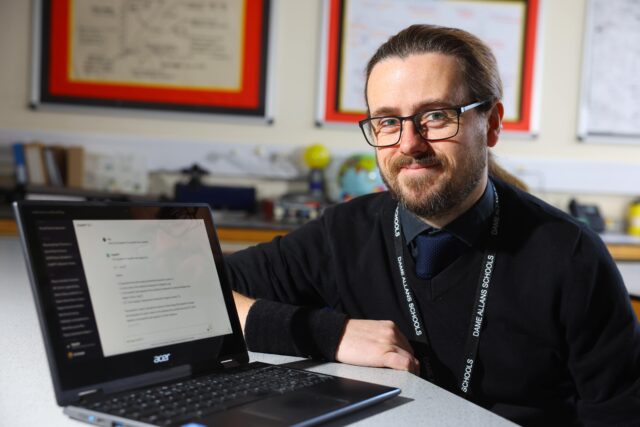Blog
Assessing in the brave new world

Professor Robert Klassen, Graham Purves and Rebecca Snell
Professor at the Department of Education, University of Oxford, Vice Principal & Head of Senior School at The Grammar School at Leeds, Educational Consultant & Research Officer, in the Education Department at the University of Oxford
Read the blog
Our pupils are already immersed in a world where AI is integral to their everyday lives: from personalised recommendations on Netflix and Spotify, to AI driven virtual assistants checking in on fitness, diet, and fashion. With the commentary of a ‘rapidly evolving landscape of education’ and a determined push to improve terminal assessments, now is the time to embrace the full advantages of what AI has to offer to assessment.
Alongside broader concerns, traditional examinations appear outmoded and out of touch with the AI enabled world. The challenge to recognise AI generated work is an extra pressure that – in some cases – is placing strain on the teacher and pupil relationship. Furthermore, the current assessment system places undue stress on students that the abilities and potential of AI can address. We can create an assessment system that reduces the emphasis on memorization, and even regurgitation, and instead focuses on meaningful learning outcomes and personal growth. There is a pressing need to modernise assessment methods to accurately reflect the technological landscape ensuring that assessments remain relevant, equitable, and reflective of genuine student achievement.

So, what could this bold new future look like?
Natural Language Processing (NLP) Algorithms: we know algorithms still feels like a dirty and visceral word post-Covid. However, using NLP algorithms we can automate marking and grading systems so that they can analyse the relevance, coherence, and accuracy of a pupil’s response to offer insight into their capabilities.
Authentic task-based assessment: this is crucial to ensure that any assessment feels relevant and is appropriate to the audience. Many of the readers of this will most likely remember fiascos with English Language examinations asking students to ‘imagine’ situations that only the wealthier students would have had the opportunity to enjoy such as surfing or foreign holidays. This would mitigate against that occurrence and offer relevant tasks that mirror real-world scenarios. For instance, students can engage with complex problems, design projects, or simulations relevant to their field of study. These assessments not only assess pupil knowledge, but also their ability to apply said knowledge in practical contexts.
Simulation activities: to build on this element of authentic task-based assessment, simulations have long been part of many University courses such as medicine and health care. Simulations provide simultaneous assessment of knowledge and soft skills in a more engaging and responsive arena than static testing. For today’s students, a dynamic assessment environment that makes use of interactive AI-generated simulations can help bridge the knowledge-practice gap: the learner interacts with the simulation (i.e., by providing solutions to a challenging scenario), responds to further events caused by a learner’s choices, and is encouraged to reflect on alternative courses of action.
Assessment of soft skills: One of the most promising assessment breakthroughs is using AI-supported tools to assess the ‘soft skills’ that have always proved challenging to capture in traditional assessment. Building a better understanding of students’ stress management, leadership skills, creativity, and resilience (to name but a few) has traditionally relied on teachers’ careful observation of student behaviours. AI offers the potential to pinpoint trouble spots, and cultivate the soft skills needed for success.
Furthermore, sentiment analysis of student responses allows exploration and evaluation of deeper meanings and emotions exhibited, with the potential to identify areas of weakness and uncertainty that could benefit from further intervention.
The Russell Group approach to generative AI is both encouraging and forward looking. The ability to control both their teaching and assessment enables them to embrace AI as they wish. Schools do not have this control over GCSEs, A-levels, and any other summative assessments their students sit. The vast majority of these in the UK fall under the auspices of JCQ, who have already reviewed their guidance, in February of this year. Whatever schools might do to embrace AI to enhance their teaching and their pupils’ learning, they still need to ensure they are preparing pupils for the summative assessments they will face, and this could put them out of kilter with universities and the working world.
It is possible to imagine a future of assessment that has the potential to offer impartial evaluation and greater accuracy whilst profoundly impacting student well-being and mental health. AI-powered systems can analyse not only academic performance but also factors such as previous achievements and personal circumstances. It is sensible to question how this is different to countries who already do not have terminal examinations such as the United States, Finland and Canada. They rely on an amalgamation of standardised tests, coursework, and report cards. AI driven assessment would enable us to take the best of all these systems, to then mitigate for bias, and ensure appropriate rigour.
Educators are embracing AI at different rates. Reasons vary from availability and accessibility to conservatism or scepticism: not wanting to be in the vanguard who might make difficult to predict (or mitigate) mistakes. Others have a sense of conservatism or scepticism: how much have interactive whiteboards really changed what happens in the classroom; is this really anything other than the next hyped new fad?! And then there are those who, despite their best intentions, are struggling to keep up: schools are exceedingly busy places. Finally, there are those who are concerned: the risk of unhelpful or even dangerous AI engagement is not zero. We already know that AI interactions and conversations can be seductively alluring to young people who, in some cases, may rely too heavily on the low-risk environment of AI which could be preferred to human interactions.
The opportunity for AI to improve the validity and worth of assessment, while also reducing the stress and anxiety, at a time of growing concerns around the mental health of our young people, should not be dismissed lightly due to concerns or ignorance. Through leveraging AI-driven assessment methods, schools and of course pupils can benefit from a more holistic, compassionate and engaging yet rigorous approach to assessment.


Written by Professor Robert Klassen, Department of Education, University of Oxford; Graham Purves, Vice Principal & Head of Senior School at The Grammar School at Leeds and Rebecca Snell, Educational Consultant & Research Officer, in the Education Department at the University of Oxford


